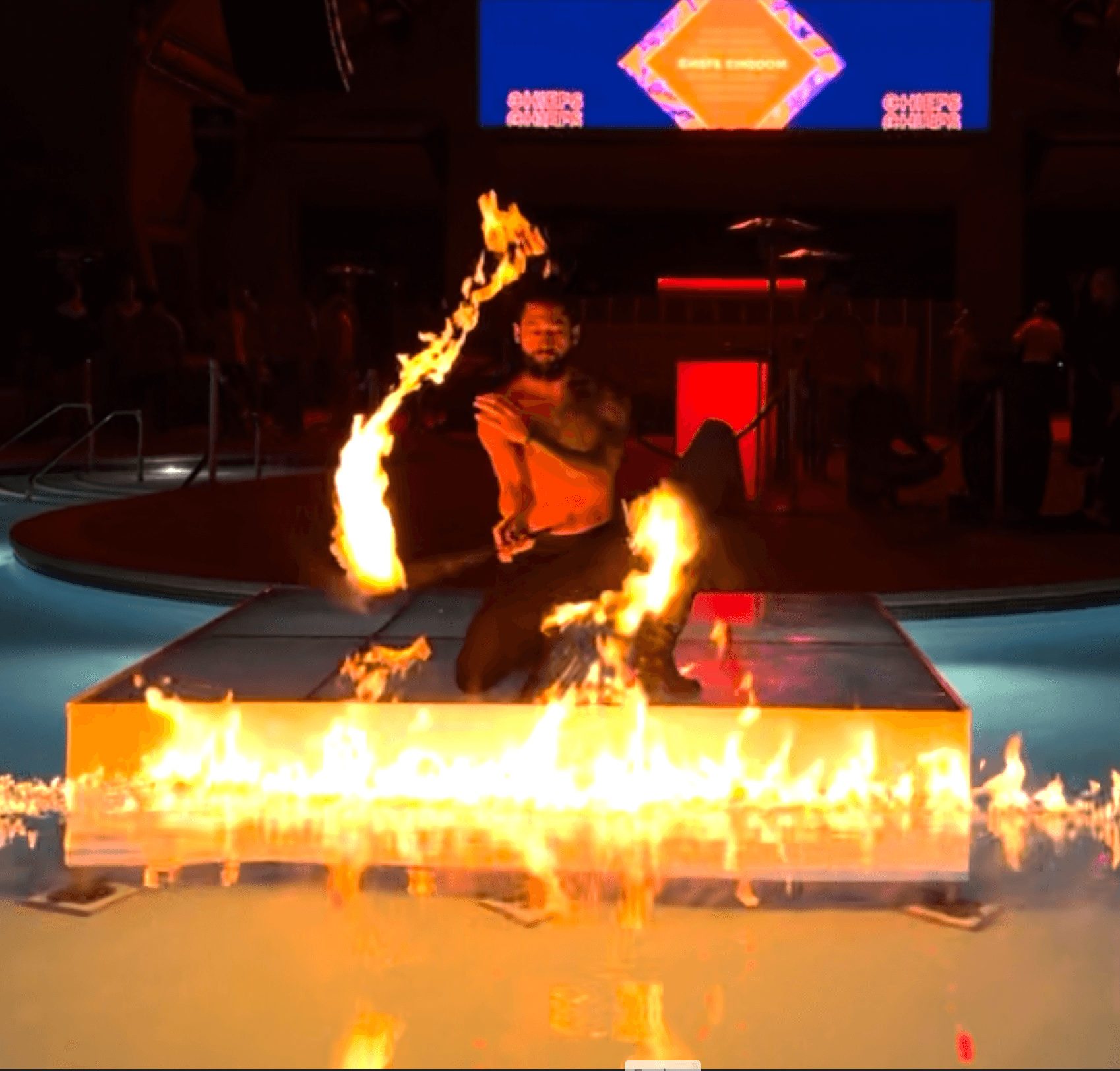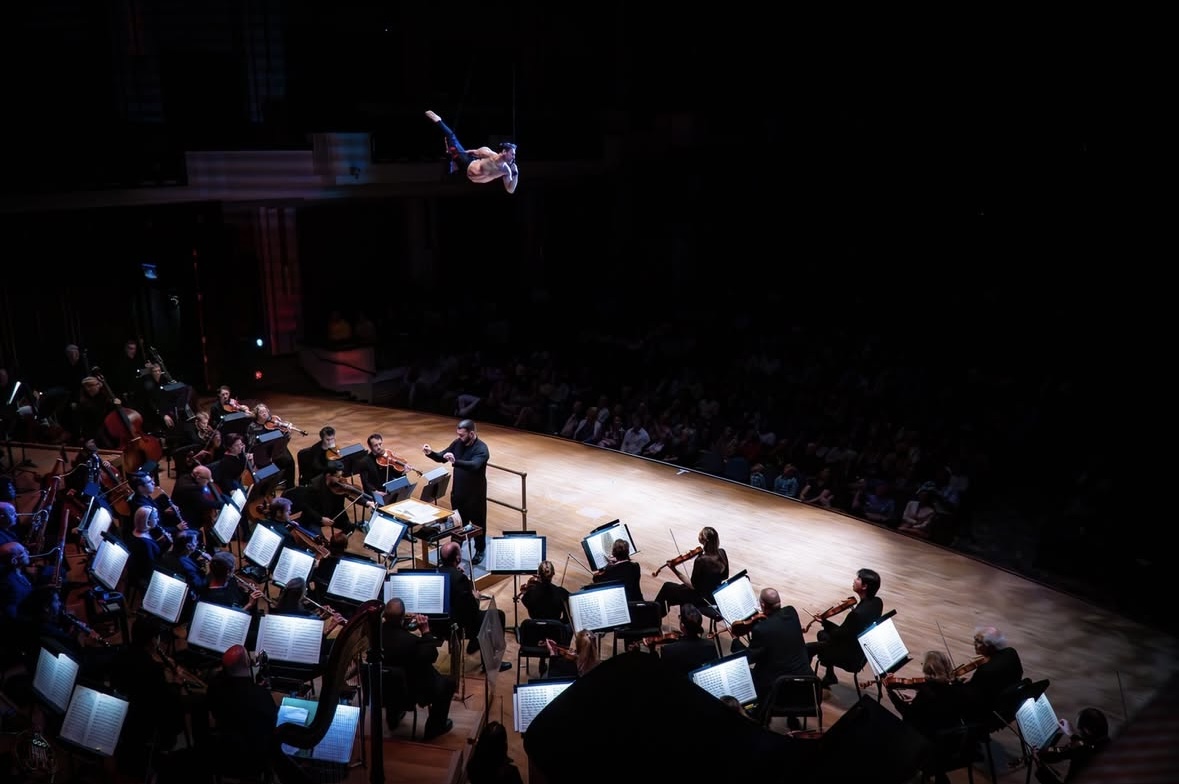We were lucky to catch up with Benjamin Lerman recently and have shared our conversation below.
Hi Benjamin, thanks for joining us today. We’d love to hear the backstory behind a risk you’ve taken – whether big or small, walk us through what it was like and how it ultimately turned out.
My life has been a series of risky decisions. I decided early on (right out of high school) to forgo the traditional path of college and instead study Kung Fu in a monastery in China. It was short-lived, but an interesting detour all the same. Upon my return to the States, I once again attempted a more traditional route, only to find myself pulled toward a new dream: to pursue a career as a performer and acrobat in Las Vegas.
Despite having zero experience in the industry, I packed all my belongings into my beat-up ’91 Honda Civic and made the long, sputtering drive through the desert to the place I’ve now called home for the past 18 years.
I’d love to say that what awaited me was a quick rise to fame and fortune, a short but arduous adventure worthy of a biopic, ending in an epic moment of triumph. But what I got instead was real life: full of ups and downs, big and small wins, hard lessons learned, and a fair share of failures.
Still, I think it’s fair to say I accomplished what I set out to do. I competed on America’s Got Talent, met and performed for Heidi Klum, Howie Mandel, Howard Stern, and even the illustrious Neil Patrick Harris (although, admittedly, he did not seem particularly impressed with my act). That early risk allowed me to hold a residency on the Las Vegas Strip, travel the world, perform in Italy, Japan, and Malaysia, direct shows aboard cruise ships, and even start my own entertainment company here in Las Vegas; providing acts for Fortune 100 companies, professional sports teams, and even a celebrity or two. That same risk also led me to meet the love of my life, now my fiancée, and opened doors to an incredible network of creatives, world-class athletes, show directors, and business moguls.
Those are the highlights, at least. But it would be disingenuous not to acknowledge that they came with a price. The acts I perform are physically demanding and have taken a toll on my body. I’ve had many injuries, one of which sidelined me for nearly five years. And then there’s the industry itself: highly competitive, with egos running amok, gatekeepers and production owners doing all they can to pay as little as possible for top-tier talent. It creates an environment where even the most dedicated and gifted performers often feel undervalued and unappreciated.
In the end, I think (and hope) it was my willingness to embrace business strategy, marketing, and sales (the very things I tried to avoid when I first left home) that made this life sustainable and has now given me an exit strategy as I grow older and become less willing to risk my physical and mental well-being for applause and bragging rights.
As I move forward, I’m eager to keep one foot in the entertainment world while exploring how my experiences can help build a better future, possibly even in other industries, for myself, my family, and hopefully, one day, for the industry as a whole. I love producing entertainment. I love being able to give opportunities to deserving, talented individuals, the same kind I had to fight so hard for when I was starting out. I love the creative process and the freedom that comes with it. If I were asked to take that same risk again, I’d do it in a heartbeat.

Benjamin, before we move on to more of these sorts of questions, can you take some time to bring our readers up to speed on you and what you do?
My journey into the entertainment world was anything but conventional. Straight out of high school, I took a leap of faith and flew to China to study Kung Fu in a monastery. That experience, while brief, sparked a deeper desire in me to pursue a life that was physically demanding, creatively rich, and far from ordinary. That eventually led me to Las Vegas, where—with no formal background in the industry—I decided to pursue a career as a professional acrobat and live performer.
I spent nearly a decade training and learning about the industry before landing my first residency (Circus Circus) which opened the doors to a world of other performing opportunities. I gained firsthand experience in what makes a performance not just good, useful. Useful to the audience (inspiring), useful to the production team or buyer (sell-able and relatable) and useful to me (sustainable and enjoyable). I also quickly learned that behind the “circus curtain” was a world of poorly managed and often abusive industry practices that lead me to realize that if I did not take the reigns and ultimately have control over my art, I would not be able to do it for very long. This prompted me to start my entertainment company Acro Factory Entertainment.
Acro Factory is a boutique entertainment agency and talent network based in Las Vegas. We specialize in highly customized entertainment experiences for corporate events, trade shows, private parties, and large-scale productions. From Cirque-style acts and ambient characters to high-level specialty performers, musicians, and full productions, we pride ourselves on delivering entertainment that feels both elevated and effortless. We’ve had the honor of serving Fortune 100 companies, major sports teams, and some of the biggest names in hospitality and tech.
The real problem we solve for clients is creative overwhelm. Event planners often know they want something exciting or memorable but don’t know where to begin or who they can trust to deliver. We step in to make their lives easier—curating talent, managing logistics, and ensuring the final experience is not only seamless but exceeds expectations. What sets us apart is that we’re not just an agency—we’re founded by performers, for performers. We understand both sides of the stage and use that insight to create better outcomes for everyone involved.
What I’m most proud of is being able to give opportunities to other artists—the kind of opportunities I had to fight tooth and nail for when I was first starting out. We work with over 1,200 vetted professionals, many of whom are Las Vegas Strip headliners or Cirque alumni, and we take pride in creating a company culture that’s both professional and artist-forward.
If there’s one thing I’d like potential clients and collaborators to know, it’s that we don’t just provide entertainment—we help tell your story through unforgettable moments. Whether you’re hosting a high-end gala, launching a brand, or planning a once-in-a-lifetime celebration, we’re here to help you elevate the experience through world-class entertainment that reflects your vision and values.

We often hear about learning lessons – but just as important is unlearning lessons. Have you ever had to unlearn a lesson?
When I first moved to Las Vegas, although I was very ambitious and eager to succeed. I also struggled with self doubt and to chronic pessimism. I had a lot of limiting beliefs and a scarcity mindset that would manifest as self sabotage in different ways (knowing I wanted something but not fundamentally believing I was capable or deserving of it)
This shifted when I decided to take on the responsibility of self education. I didn’t know what I didn’t know, but I knew I didn’t know something. It was one of the lowest points for me, I had recently wrecked my car and did not have enough money to purchase a new one.
I had read an article about how Bill Gates read 1 – 3 books a month, including a list of his top recommendations. I took the last 30 dollars in my bank account and got an audible membership. I would walk to the gym to train and listen to audio books during the long walk. I decided I would only listen to information that had a chance og helping me: Business Strategy, Self Help, Auto Biographies of individuals I admired and Philosophy.
The first book I downloaded was a book called the Success Principles by Jack Canfield, and one of the first concepts that the book talks about is the idea of an internal locus of control,
Basically the idea is that there are two types of people in the world. People who believe that their life is the result of external experiences (external locus of control) and those who believe that the sum of their lives are controlled by internal factors; mindset, attitude, belief systems and self imposed habits.
Upon reading about this concept it occurred to me that I had somehow, mainly by the default of my upbringing and education, I had somehow fallen into the former category, as I believed at the time that I didn’t really have all that much control over the outcome of my life, only that I could work as hard as I could when I had the energy and hope for the best.
This was a turning point in how I operated in the world, and it began a life long obsession with self reflection, working on my belief systems and assumptions and slowly turning that external locus of control into an internal one, showing myself that I had a say in how my life would turn out. Although I have had many financial highs and lows since then, that was the last time I ever felt, truly broke.

In your view, what can society to do to best support artists, creatives and a thriving creative ecosystem?
I think it’s important that we support other people’s dreams, even if we don’t personally see the viability in them. Sometimes, all it takes is one person believing in you to give you the courage to go out and make something happen.
Not everyone can support the arts financially, beyond buying a movie ticket or tossing a few dollars into a busker’s hat. However, support can take many forms. A kind word, a social media like or share. Small gestures of support can mean a lot to someone who’s unsure whether their hard work or talent has any value or future.
At the very least, don’t discourage someone from pursuing something you don’t understand. Art is one of the least destructive and most enriching pursuits in the world. If you choose not to support it, that’s your right, but please don’t stand in the way of others who do.
And if you can afford to support the arts on a larger scale, I encourage you to seek out local artists. Hire a painter to create a mural in your office. Book a circus troupe or musicians for your next company event. Donate to after-school programs, children’s theaters, circus schools, dance studios, and community art spaces.
Nobody ever visited a place and said, “It was nice, but there was too much art.”
Contact Info:
- Website: https://www.acrofactory.com
- Instagram: @acrofactorytalent
- Linkedin: https://www.linkedin.com/in/benjamin-lerman-6457a1109/
- Yelp: https://www.yelp.com/biz/acro-factory-entertainment-las-vegas?osq=Acro+Factory+Entertainment






Image Credits
Acro Factory Entertainment LLC. Jacksonville Symphony


